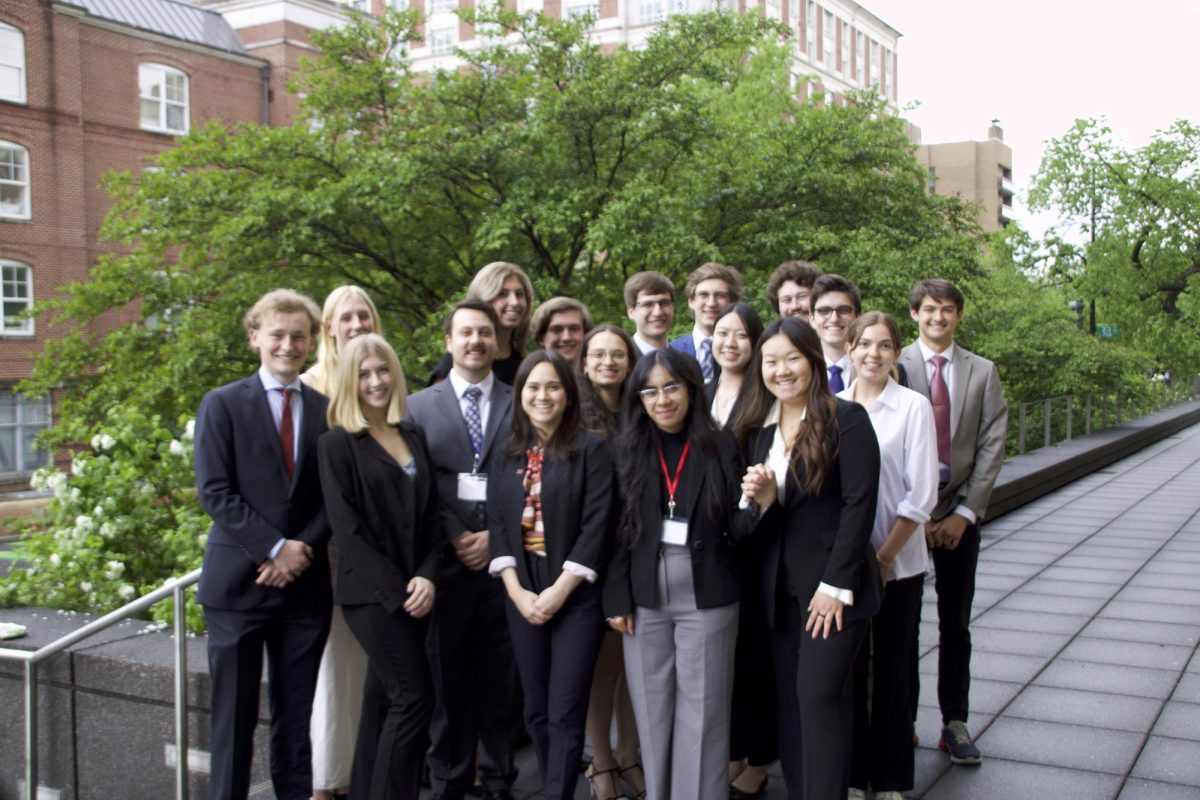Around a table in Monroe Hall last week, war brewed between ancient Greek cities.
But Thursday’s revival of bygone tensions was not part of a Greek history course or a reenactment of Percy Jackson. The imaginary clash was part of an experiential learning and crisis management training hosted by the Strategic Crisis Simulations, a student organization for people interested in conflict to meet and practice drills modeled after modern or historical geopolitical events.
“We don’t make up country tensions or country relations,” Vice President of Administration Caroline Gilmore said of the student organization, which is affiliated with the Elliott School of International Affairs. “The point is to teach students really: How does war policy work? How does diplomacy work? How does national security function?”
Last week’s drill, titled “In Xerxes’ Shadow,” was based on the Peloponnesian War, when the ancient city-states of Athens and Sparta and their respective allies, Corcyra and Corinth, fought for control of the region. Students were assigned to the four city-states and prepared for war by managing their ‘assets,’ including merchants and ships.
“A wargame is like a strategic exercise, is how I like to describe it,” Gilmore said. “We’re letting people take on the roles of different countries and different departments of government in order to learn about how the decisions are really made in government and policy is pursued.”
Gilmore said after joining SCS as a freshman representative, when she was tasked with writing simulations and hosting social events, she discovered her interest in diplomacy and policy, which led her to switch her major to international affairs.
“There is such a community of inspirational older students at a great school who have friends, really active social lives, so I was like, this is a really smart place to be,” Gilmore said.
Gilmore said SCS also holds formal, all-day events involving more intense policymaking and negotiating, unlike last week’s fast-paced Greek drill. The group hosts simulations twice a semester and are open for anybody to attend. Students in the SCS said they also benefit from receiving feedback from the professors, alumni and industry professionals who attend the events.
“In Xerxes’ Shadow” was a kinetic drill, meaning the city-states were allowed to move their assets of ships and merchants across a map of Ancient Greece. This is opposed to non-kinetic game-play, where events can only unfold by players making and negotiating policy.
The game occurred in eight turns, lasting about two hours, with the control team, a group of three executive board members at the front of the room, granting teams’ requests and updating the state of the game between each turn. They were also in charge of the map presented on the whiteboard and used dry erase markers to move ships and merchants around the model of Ancient Greece.
“The goal is not combat, the goal is not peace,” said Beckett Fordahl, a sophomore and another vice president of programming. After briefing players on the state of events and announcing the game was about to begin, Fordahl said the purpose was to emphasize the process of war.
Players got a few moments to look over their player sheets, learn about the state of Ancient Greece in 431 B.C., figure out who their allies were and how many assets they had in their control.
In these packets, players learned that each city-state was associated with their own God, and they could call upon the blessing of this God to help them during the game. They would put in a request to the control team, who would decide how best to grant it at their discretion. Players could also consult the ‘oracle’ to ask for advice, which they would receive from control team immersive actor sophomore Kate Beliveau.
About 25 players participated in the drill, moving back and forth across the room to meet with their allies and make requests to the control team. Between turns, the control team would grant teams’ requests to update the location of ships and merchants they had in the sea. Many stopped to look at the map displayed on screens throughout the room, assessing potential travel paths and battlegrounds.
As one team’s efforts devolved into chaos, they began to make jokes, offering to host the next Olympic Games despite the various security threats facing the region. Another team received a blessing from their god, Pan, in the form of unfortunate weather plaguing the other teams. At the end of the drill, the control team announced which team had come out on top — Corcyra — and which had suffered the most difficulty — Corinth.
All of the drills, including these packets, are produced in house. The executive board is made up of the administrative team and the programming team, who design drills and simulations. The group has a vast library of past years’ drills on Google Drive, where Fordahl found this one and started to update it by altering pictures, information and wording.
“This one, I spent the week working on,” Fordahl said. “It’s from 2019, I was expecting it to go pretty well, I’m very happy to see this amount of engagement and creativity going on right now.”
He also put an effort into making sure the game was balanced and fun, which is a little bit easier to achieve in the SCS, where they do not usually name a winner.
“People can all decide a winner if they want, but people can change their goals a little bit as we go depending on how the game is working,” Fordahl said. “It’s basically just trying to solve the situation as best you can.”




